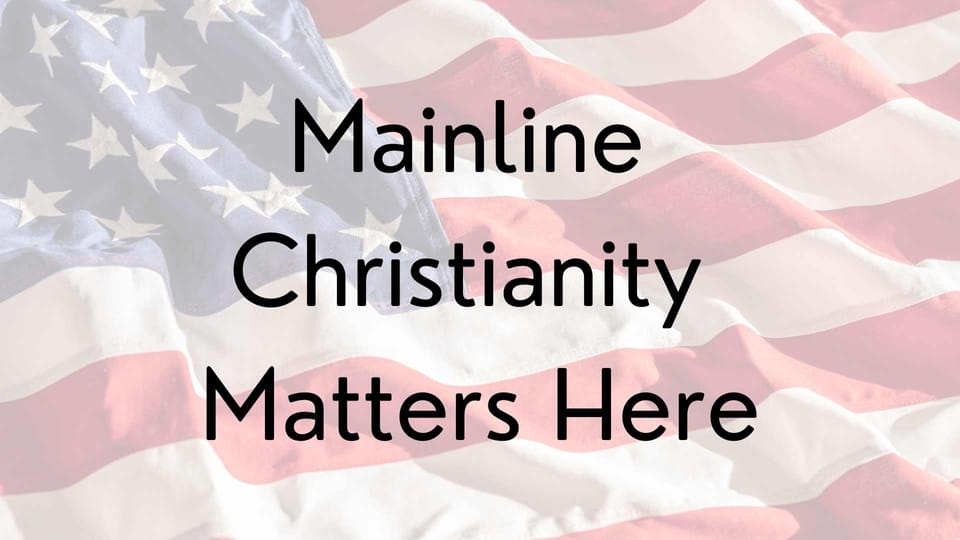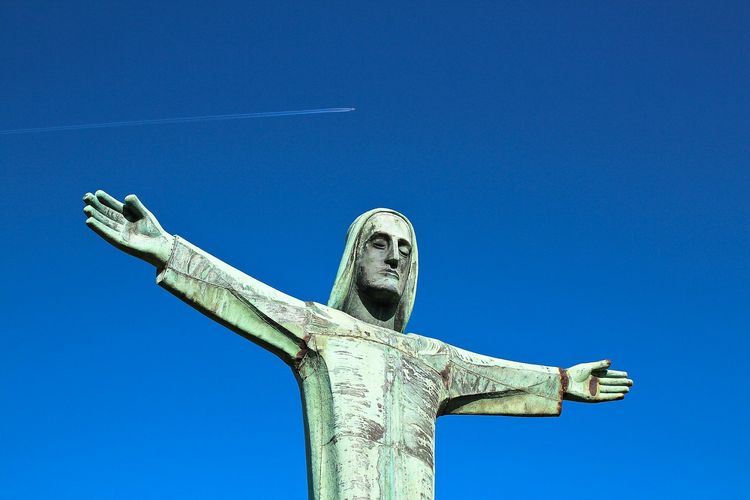American religious life has political consequences.

In 2025, religion and politics are clearly connected. How they connect isn't completely clear. The President of the United States promised Christians a return to power. Then he used his power to withhold funds for food - and not just once. This isn't what Jesus Christ teaches.
I'm a disciple of Jesus Christ and a priest in the Episcopal Church. How Christianity is practiced in America matters to me. I'd like to help get it back on track.
So I recently went to a conference held by the Episcopal Parish Network. This group has no decision-making authority. It gets Episcopalians together for networking and learning.

At this gathering, our numeric decline was taken seriously. Our new Presiding Bishop Sean Rowe said,
"When Jesus says, 'wherever two or three are gathered,' remember that's the minimum."
He obviously believes our church can grow and sees his role as serving that work at the local level. I welcome that cultural change.
Too often, my church hasn't been willing to face the facts of our numeric decline. This gathering both surfaced those facts and encouraged creative thinking. That's a rare combination in religious leadership today.
On the last day of the gathering, Dr. Ryan Burge spoke. Dr. Burge analyzes and reports on religious engagement in America professionally. He said some things we needed to hear, and even more - that we need to act on. I learned a few key facts from him that I hadn't known before, and that need to be known more widely.
The mainline has declined for seventy-five years.
Mainline Christianity includes my church and six culturally similar churches.
In the 1950's, mainline Protestants were 50% of America. In the 1970's, mainline Protestants were still 30% of the population. Today, those same seven churches only make up 9% of America.
That's a steep, consistent curve of decline. I know it personally.
I started being curious about the Episcopalians in the late 1990's, and joined in the early 2000's. I've had a front row seat to our decline. As I got more committed, I saw others leaving - particularly people my age and younger. I could understand why: there wasn't a goal or a plan to keep them engaged.
Over a decade ago, Rachel Held Evans began to write about her experience with mainline Christianity. She pointed out our lack of passion for reaching people. She quoted Frank Schaeffer, who wrote,
"If the mainline churches would work for the next few years in a concerted effort to gather in the spiritual refugees wandering our country they'd be bursting at the seams."
But we didn't.
It wasn't because we didn't care. It was because gathering in new people wasn't part of mainline church culture. Neither was working to keep young people. Historically, we hadn't had to focus on either of these goals.
In the 1950's and early 1960's, if you were a mainline Protestant, 50% of the population was part of a church like yours. You didn't need to explain why it mattered. You almost didn't even need to think about it. It was culturally normative, expected, almost taken for granted.
Then, very slowly, that changed. The wider culture no longer sent people into mainline church doors. The tides turned and the wind shifted, but nobody moved the sails to match the weather.
The weather changed so slowly that it took decades to be visible to most people. Now, it's evident.
These days, the Episcopal Church looks like this:

Half of my church is over age 65. By contrast, less than 20% of the American population is over age 65.
Young people began to stop going to church in the 1990's. At that time, church leaders barely noticed, and didn't act effectively to seek to reverse the trend.
(I noticed! I started going to church in the 1990's. It was obvious there weren't many other people my age. It was also obvious that this wasn't being discussed in public by anyone who could do anything about it.)
The senior adults who make up half the Episcopal Church are concerned for its future. So am I.
If the mainline continues to decline, I'm also concerned about America's future.
Mainline Christianity supports a civil society. That matters to everyone.
Core cultural practices within mainline Christianity support well-being for all:
Mainline Christians use reason to understand Scripture. Mainline Christians don't tolerate religious abuse or authoritarianism.
Mainline Christians respect people of all faiths and none. Mainline Christians aren't out to convert people by coercion or force.
Mainline Christians serve whole communities. Mainline Christians aren't only interested in serving other Christians.
I've cared about the health and growth of my church for a long time. For most of those years I only cared about it because it saved my life.
This strand of Christianity gave me an authentic connection to Jesus Christ. In this tradition, I can bring my whole self - mind, heart and soul. Nobody has ever shamed me or shut me down for asking a question in a mainline church. I was raised without religion, but I need religion – this kind of religion – to live wisely and well.
That's a good enough reason to care. But these days, I care because I see how much mainline churches matter to the social fabric of America. Mainline churches aren't perfect, but we do value the practice of love as the way of Christ. That core value helps us self-correct (eventually!) when we go wrong.
Without a robust mainline church, I don't know what will happen to my country. So now, I have more than one reason to work toward the health and growth of my church. Whether you belong to it or not, I believe we make a difference for you.
You can watch Dr. Burge's entire presentation in the first fifteen minutes of this video. It's worth your time.
I also commend the presentation provided by The Very Rev. Dr. Andrew McGowan, of Yale Divinity School. He spoke a bold and faithful word that the whole church needs. Longer than fifteen minutes, but really really good:
It has been a few weeks since I left this gathering. What has stuck with me is the importance of taking these lessons home into decision-making where I live. I'm grateful for excellent local leadership to work with, and curious about what God might do in our midst.




Member discussion